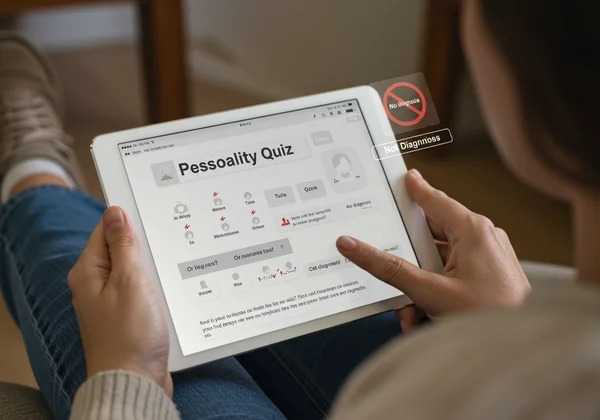Sociopath Test: Understanding Sociopathic Traits vs. ASPD Diagnosis
November 13, 2025 | By Roman Caldwell
Have you ever taken an online quiz about personality traits and wondered what the results truly mean? It's a common path to self-discovery, but it can also lead to confusion, especially with terms as loaded as "sociopath." It's natural to wonder, 'Am I a sociopath?' when we notice certain behaviors in ourselves or others. However, understanding the crucial difference between possessing sociopathic traits vs ASPD (Antisocial Personality Disorder), and how a reliable sociopath test can offer initial insights, is the most critical step toward clarity. This article will demystify these concepts, helping you navigate your journey of self-reflection responsibly. An online screening can be a great starting point, and you can always get initial insights from our free sociopath test on our platform.

What Are Sociopathic Traits? Insights from a Sociopath Test
Sociopathic traits are specific behavioral patterns and characteristics. Think of them as individual ingredients rather than the entire cake. A person might exhibit one or more of these traits to varying degrees without having a full-blown personality disorder. They exist on a spectrum, and many people may display a mild trait, like occasional impulsivity or a moment of callousness under stress, without it defining their entire personality.
Recognizing Key Traits an Online Sociopath Test Measures
To understand what you might be looking for, it helps to identify the characteristics commonly linked to the concept of sociopathy. These are the very patterns a sociopath test is designed to explore. Key indicators often include:
- A disregard for right and wrong: Consistently bending or breaking rules and social norms without concern for the consequences.
- Persistent lying or deceit: Using manipulation and dishonesty to exploit others for personal gain or amusement.
- Impulsivity and failure to plan ahead: Making decisions on a whim, often without considering the long-term impact on themselves or others.
- Irritability and aggressiveness: A tendency towards physical fights, arguments, or a generally hostile demeanor.
- Lack of empathy or remorse: An inability to understand or share the feelings of others, and a failure to feel guilty after hurting someone.
While recognizing these signs is a vital first step, remember that context is everything. Many of these behaviors can have different root causes. A tool like our free sociopath self-assessment can help you reflect on these patterns from a safe distance.

When Sociopathic Traits Don't Equate to a Disorder: The Spectrum of Behavior
Here lies the most important distinction: exhibiting some of these traits does not automatically mean you have a personality disorder. Personality is incredibly complex. A business leader might display a calculated disregard for competitors' feelings to succeed, or a teenager might act impulsively as part of their development. These isolated instances are very different from the pervasive, life-long, and destructive patterns that constitute a clinical disorder. The key difference is one of degree, frequency, and the level of impairment it causes in one's life and the lives of others.
Unpacking Antisocial Personality Disorder (ASPD): A Clinical Perspective
While "sociopath" is a term used widely in popular culture, the clinical community uses a more precise term: Antisocial Personality Disorder (ASPD). This is not just a collection of traits; it is a formal mental health diagnosis found in the Diagnostic and Statistical Manual of Mental Disorders (DSM-5), the standard classification used by mental health professionals. ASPD is a deeply ingrained and enduring pattern of behavior that significantly deviates from societal expectations.
The DSM-5 Criteria for a Clinical ASPD Diagnosis
For a mental health professional to diagnose ASPD, a person must show a pervasive pattern of disregard for and violation of the rights of others, occurring since age 15. This pattern is indicated by meeting at least three of the seven specific criteria, which closely mirror the traits listed earlier but are evaluated in a much more rigorous context. Critically, the individual must be at least 18 years old, and there must be evidence of Conduct Disorder before age 15. This historical context is vital for a formal diagnosis and highlights the long-standing nature of the condition. This is why a simple online quiz cannot replace the need to explore preliminary insights before a clinical assessment.
Why Professional Diagnosis is Crucial: Beyond an Online Sociopath Test
Let's be unequivocally clear: no online test, article, or self-reflection can provide a diagnosis of Antisocial Personality Disorder. The official test for sociopath tendencies, or rather ASPD, is a comprehensive psychological evaluation conducted by a qualified psychiatrist, psychologist, or clinical social worker. This process involves:
- In-depth clinical interviews about personal and family history.
- Discussion of life patterns, relationships, and work history.
- Assessment of symptoms against the strict DSM-5 criteria.
- Ruling out other potential mental health conditions that could explain the behavior.
This professional evaluation is the only legitimate pathway to an ASPD diagnosis.

Why This Distinction Is Crucial for Self-Understanding and Next Steps
Understanding the line between traits and a clinical disorder is not just an academic exercise—it is essential for your mental well-being and personal growth. Confusing the two can lead to unnecessary anxiety, self-stigma, or the misjudgment of others. It empowers you to use self-assessment tools correctly and know when it’s time to take the next step.
The Value and Limits of Online Self-Assessment Tools
Online resources, like the online sociopath test offered on our site, are powerful tools for self-reflection. Their value lies in providing a private, structured, and non-judgmental way to explore your own behavioral patterns. They can:
- Increase Self-Awareness: Help you identify tendencies you may not have consciously recognized.
- Provide a Starting Point: Offer a preliminary framework for understanding your concerns.
- Organize Your Thoughts: Give you specific points to bring up if you decide to speak with a professional.
However, their limits are just as important. These tools are screeners, not diagnostic instruments. They measure tendencies and traits, not disorders. A high score suggests that further reflection or professional consultation might be beneficial, nothing more.

When to Seek Professional Guidance for Persistent Concerns
If the traits you've identified in yourself or someone else are causing significant distress, damaging relationships, or leading to legal, financial, or occupational trouble, it is time to seek professional guidance. Consider consulting a mental health expert if:
- Behavior patterns are persistent and long-lasting.
- You or others are being harmed by these actions.
- There is a significant impairment in social, work, or family life.
- You feel unable to control impulsive or aggressive urges.
A professional can offer a proper diagnosis, provide context, and develop a safe and effective management plan.
Your Path to Clarity: From Self-Reflection to Professional Insight
Ultimately, navigating the complex world of personality is a journey of continuous discovery. It's crucial to distinguish between possessing certain 'sociopathic' traits and receiving a clinical ASPD diagnosis, as understanding this difference is key to your self-awareness. Traits are points of information for self-awareness, while a diagnosis is a clinical conclusion reached only by a qualified professional after a thorough evaluation.
Use tools for what they are: mirrors for reflection. They can illuminate patterns and guide your thinking, but they cannot and should not replace the insight of an expert. If you're ready to take a confidential first step in understanding your own traits, we invite you to start your confidential sociopath test on our platform. Your path to clarity begins with informed understanding.
Frequently Asked Questions About Sociopathic Traits and ASPD
Can I diagnose myself with ASPD based on an online test?
No, absolutely not. Online tests are screening tools designed for self-reflection and educational purposes only. They can indicate the presence of certain traits but cannot provide a clinical diagnosis. A formal diagnosis of Antisocial Personality Disorder can only be made by a qualified mental health professional through a comprehensive evaluation.
What's the main difference between a sociopath and a psychopath?
While often used interchangeably, these terms have different connotations in psychology. "Sociopathy" is generally linked to ASPD and is thought to stem more from environmental factors, with individuals sometimes capable of forming limited attachments. "Psychopathy," a more severe condition, is considered to have stronger genetic roots and is characterized by a complete inability to form emotional bonds. Only a professional can parse these distinctions accurately.
Do people with sociopathic traits always have ASPD?
No. Many people exhibit one or more sociopathic traits to a mild degree without meeting the criteria for ASPD. A personality disorder is defined by a pervasive, inflexible, and long-term pattern of behavior that causes significant distress or impairment in functioning. Simply having some traits does not equate to having the disorder. To understand where you might fall on this spectrum, our confidential sociopath personality disorder test can offer preliminary insights.
If I score high on a sociopath test, what should I do next?
A high score should be seen as a prompt for further, deeper reflection, not a label. Consider it an indicator that some of your behavioral patterns align with those measured by the test. The recommended next step is to discuss these concerns with a trusted mental health professional who can provide proper context, conduct a formal assessment if necessary, and guide you on a path toward greater well-being.